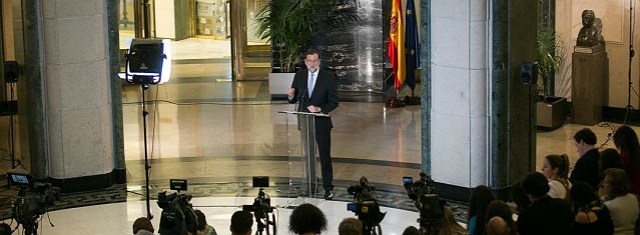Politics
Rajoy offers five major agreements of State for a stable Government
Meets Friday with Socialist candidate

Rajoy (Source: Pool)
The five agreements were explained on Thursday to the president of the centrist Citizens, Albert Rivera, during the meeting the two leaders held in Parliament. It is a document with five major Covenants of State to form a stable Government for four years led by the largest party in the last general elections. The five agreements are, first, the relative growth and employment, ensuring the consolidation of the economic recovery and meeting the path of budgetary stability agreed with the EU, although making use of the flexibility offered by the EU, as it has done on other occasions not only in Spain but in other European countries.
Second, would the Pact for Fiscal Reform and the regional financing; thirdly, the Conservative leader referred to the Social Pact to reach agreements that would serve to strengthen the pillars of the welfare state policies. Rajoy closed five major proposed agreements pointing to a Pact for Education and one for institutional strengthening, including a commitment to defend Spain's unity and national sovereignty.
During his appearance before the press, Mariano Rajoy explained that the five major covenants "make a moderate agenda that can match the vast majority of the Spanish people" and considered that "it would be best for Spain". This, he said, "is a living document, to agree, and a lot of sense, and it would be very well regarded in Europe." According to the president of the Popular Party, the first of the agreements would be for economic growth and jobs "to consolidate the economic recovery and it reaches all citizens."
To do this, he said that "Spain has to fulfill the path of budgetary stability, but also can make use of the flexibility offered by the European Union." "Maintaining fiscal stability is essential for growth, creating jobs and maintaining and improving the health, education and pensions," he said. Another point of agreement is seeking a Social Pact. Rajoy said that "this is to strengthen the pillars that guarantee." PP president said that "we must improve the resources of the Government to provide a homogeneous social protection to citizens with a more vulnerable." He also offered a Pact for Education. "Education is the foundation of all, a better country, but also capital to better use is achieved," he said.
Regarding institutional strengthening, the PP leader expressed his "commitment to the unity of Spain and national sovereignty" and the European project, in addition to affirming that collect as many contributions made to it from other political groups on the fight against corruption. After the meeting with Rivera held at the Congress of Deputies, the Conservative leader said the meeting "was cordial" and also documents containing proposals, which have agreed that their respective teams in "the next few days to consider exchanged sit at the table next week."
Mariano Rajoy recalled that, following the outcome of the elections of 20-D "citizens have asked us to dialog and reach an agreement between parties." "A Government led by the PP, which is who has won the elections with the support of 252 deputies where you can make lasting reforms," he said, while adding that "the Government would give a good message from the point of view economic" internationally and nationally.
For the acting President of the Spanish Government, "an executive between PSOE, Podemos and independence, would be a radical Government and would have many difficulties within the European Union." In this regard, Mariano Rajoy recalled that the risk premium in Portugal, a country governed by the Socialists, is now at about 470, and Spain has risen to 150.
Liability for this article lies with the author, who also holds the copyright. Editorial content from USPA may be quoted on other websites as long as the quote comprises no more than 5% of the entire text, is marked as such and the source is named (via hyperlink).






